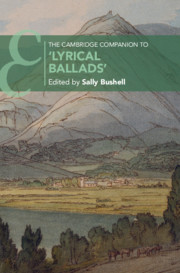Book contents
- The Cambridge Companion to ‘Lyrical Ballads’
- The Cambridge Companion to ‘Lyrical Ballads’
- Copyright page
- Dedication
- Contents
- Contributors
- Acknowledgements
- Chronology
- Abbreviations
- Introduction
- Part I Part and Whole
- Part II Subjects and Situations from Common Life
- Chapter 5 Conversation in Lyrical Ballads
- Chapter 6 The Power of Things in Lyrical Ballads
- Chapter 7 Marginal Figures
- Part III Feeling and Thought
- Part IV Language and the Human Mind
- Part V A Global Lyrical Ballads
- Guide to Further Reading
- Index
Chapter 7 - Marginal Figures
from Part II - Subjects and Situations from Common Life
Published online by Cambridge University Press: 08 February 2020
- The Cambridge Companion to ‘Lyrical Ballads’
- The Cambridge Companion to ‘Lyrical Ballads’
- Copyright page
- Dedication
- Contents
- Contributors
- Acknowledgements
- Chronology
- Abbreviations
- Introduction
- Part I Part and Whole
- Part II Subjects and Situations from Common Life
- Chapter 5 Conversation in Lyrical Ballads
- Chapter 6 The Power of Things in Lyrical Ballads
- Chapter 7 Marginal Figures
- Part III Feeling and Thought
- Part IV Language and the Human Mind
- Part V A Global Lyrical Ballads
- Guide to Further Reading
- Index
Summary
One winter evening in Somerset, in the early months of 1798, Dorothy Wordsworth observes ‘the moon and two planets; sharp and frosty … The sea very black, and making a loud noise as we came through the wood, loud as if disturbed, and the wind was silent’ (DWJ 147). In between these descriptions of natural phenomena she records, as if in parentheses: ‘Met a razor-grinder with a soldier’s jacket on, a Knapsack upon his back, and a boy to drag his wheel’ (DWJ 147). Unlike the lyrically suggestive accounts of sea, wind and sky, this human encounter is pared to a sequence of bare facts and, while we may deduce that the man is an army veteran now making a living as an itinerant laborer, no attempt is made to derive any further significance from the incident. In the Alfoxden Journal this entry marks the only meeting with a stranger encountered on the roads. By contrast, in the 1800–1803 Grasmere Journal Dorothy records numerous meetings with men, women and children on the public highway and, more often than not, these meetings yield insights into the consequences for the rural poor of the British involvement in the war against revolutionary France, and of the Pitt government’s relentless pursuit of socio-economic ‘improvements’ to support this involvement. Many of these meetings were subsequently developed in poems written by Wordsworth. But, whether written as poetry or in prose, the stories of these outcast and denuded figures, striking in their mundanity, were to cast a searching light on the iniquities of the times.
- Type
- Chapter
- Information
- The Cambridge Companion to 'Lyrical Ballads' , pp. 118 - 134Publisher: Cambridge University PressPrint publication year: 2020

